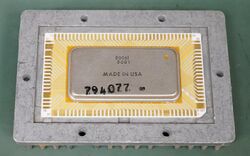Engineering:HP 9845C
| File:250px | |
| Developer | Hewlett-Packard |
|---|---|
| Type | Desktop computer |
| Release date | 1980[1] |
| Introductory price | US$39,500 (today $150,700)[1] |
| Discontinued | 1984 (being outcompeted by the 200 series)[2] |
| CPU | Standard option 1xx: 2 x 16-bit (LPU,[3] PPU) 3-chip hybrid processor with BPC, IOC and EMC |
| Memory | 64 - 1600 KB RAM 128 KB ROM[1] |
| Graphics | 560 x 455 pixels @ 3 bpp (8 color)[1] |
| Power | Mainframe: 275 W (max), CRT display: 550 W (max)[1] |
| Mass | 48.1 kg (106 lb)[1] |

The HP 9845C from Hewlett-Packard was one of the first desktop computers to be equipped with a color display and light pen for design and illustration work. It was used to create the color war room graphics in the 1983 movie WarGames.[4][5]
Features
The attached HP 98770A color display enabled the color graphics with its own CPU and separate power supply, a vector generator based on the AMD2900 bit-slice architecture, graphics memory with three planes of 32 KB each, the connection interface to the mainframe consists of a direct data bus attachment, and a light-pen logic.[1] 4913 colors were available.[1]
The system is a big-endian 16-bit architecture, the BPC, with roots in the HP 2116A which were one of the first 16-bit microprocessors created.[6]
The display showed 8 soft keys on the lower end of the screen, 39 alignment controllers behind a door enabled fine tuning of color convergence.[1]
The speed of the builtin BASIC language was accomplished by implementing time critical parts of it in CPU microcode.[1]
A builtin tape cartridge device with a capacity of 217 kB and transfer speed of 1440 bytes/s enabled storage of data.[1] Average access time for the unit is 6s and a rewind end to end takes 20s. The directory is stored in r/w memory to enable quick access.[7]
| Option 1xx | Option 2xx | |
|---|---|---|
| For/Next | ~95 | ~145 |
| Matrix Plot | ~200 | ~240 |
| Absolute Plot | ~5 000 | ~5 000 |
| Circles/s not clipped | ~2 | ~5 |
See also
There are four commercial game compilations for the HP 9845 computers, all released from Hewlett-Packard[8][9]: 9845 Computer Games Collection, 9845B Computer Games Library, Computer Games Library Vol. 1 and Monte Carlo Simulation.
See also
- HP 9800 series HP desktop computer product line
- HP DC100 - DC100 tape format and drive
- LDS-1 (Line Drawing System-1)
References
- ↑ 1.00 1.01 1.02 1.03 1.04 1.05 1.06 1.07 1.08 1.09 1.10 1.11 "The 9845C". 2012-08-29. https://www.hp9845.net/9845/hardware/9845c/. Retrieved 2013-06-30.
- ↑ "HP Computer Museum". https://www.hpmuseum.net/display_item.php?hw=149. Retrieved 2013-06-30.
- ↑ "The HP 9845 Assembler Project". 2010-02-21. https://www.hp9845.net/9845/projects/assembler/. Retrieved 2013-07-02.
- ↑ Swartz, Jeffrey. "Making 'Wargames' computers compute required innovative programming". Mini-Micro Systems (June 1984): 135-145. https://bitsavers.org/magazines/Mini-Micro_Systems/198406_Making_Wargames.pdf.
- ↑ "Screen Art: War Games". hp9845.net. https://www.hp9845.net/9845/software/screenart/wargames/.
- ↑ "The 9845 System Architecture". 2013-06-09. https://www.hp9845.net/9845/hardware/architecture/. Retrieved 2013-07-02.
- ↑ "9845B/C CE Handbook". 2009-08-17. http://bitsavers.informatik.uni-stuttgart.de/pdf/hp/98xx/09845-90039_CEhbk_Apr84.pdf. Retrieved 2013-06-30.
- ↑ Arcade-History
- ↑ 9845 Games
External links
- hpmuseum.net: HP Computer Museum, 98x5 Computers Selection
- archive.org/bohemiae.com: HP 9845B - Summary
- uni-stuttgart.de: 9845B/C CE Handbook (.pdf 2009-08-17)
 |
